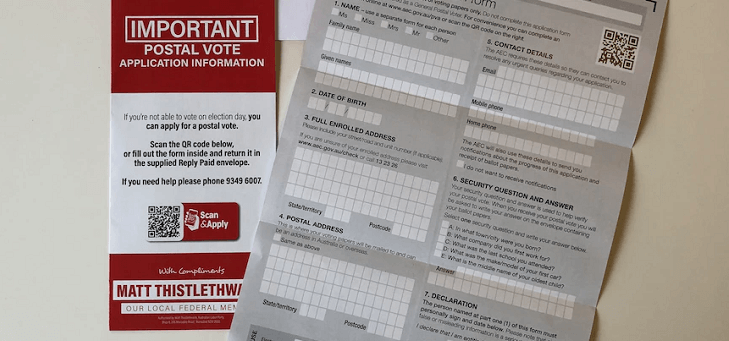Australian political parties reaching out to you with postal vote registration forms ahead of election day may be just as interested in your personal data as helping you cast a ballot.
Soon after Prime Minister Scott Morrison called the election, many Australians began receiving text messages and letters in the mail encouraging them to apply for postal votes.
It’s a method of voting that is expected to explode in popularity this election as constituents seek to avoid crowded polling stations in response to the COVID-19 pandemic.
However, these postal vote notices didn’t originate from the Australian Electoral Commission (AEC). They are sent by political parties, including Liberal and Labor, which are continuing a long tradition of trying to direct postal vote applications through their offices.
While the practice has always made some voters uneasy, privacy experts have voiced concerns over the new direction it has taken in this election campaign.
Instead of directing would-be postal voters to their own party websites, both the major parties have registered new sites with generic names to handle these online requests.
The Liberal Party has set up a site with the postal.vote web address and Labor has bought the howtovote.org.au domain.
Websites using words with search-friendly terms are also more likely to be stumbled across if voters are looking online for more information about how to cast their ballots on 21 May.
Furthermore, these websites are being spruiked through mass text messages and Facebook advertisements.
South Australian voter John Taylor, who lives in the electorate of Sturt, received a text message from the Liberal Party, which directed him to the postal.vote site.
But Mr Taylor had suspicions about the website.
“They should be sending me to the electoral commission, not to their site,” he said. “It’s not straightforward.”
While the practice is legal, nothing stops a party from looking at your application – which includes your name, date of birth, address and contact details – before forwarding it onto the AEC.
The Liberal application, both on paper and on the website, also asks for answers to a voter’s security question such as what company they work for, where they went to school and what their first child’s middle name is.
Its security question mirrors the AEC form exactly.
The Labor website, however, asks voters to input their personal and contact information before directing them to the AEC website where they need to fill it out again in order to be properly registered.
The privacy policy for Labor’s postal vote registration website said the information it collects, including “in registration process”, could be used to “communicate with you about various material”.
It does not provide much information beyond that voter data will not be disclosed to “any other third party, except where legally required”.
There is no privacy policy on the Liberal Party postal registration site.
A spokesman for the AEC said it had observed a “digital evolution” from both major parties in how they were distributing their applications for postal votes.
“There are more generically named websites being [hosted] by the major parties who are also leading them to those pages through text messages and QR codes,” the AEC spokesperson said.
“It wasn’t something seen in previous elections.”
He said applications for postal votes sent to parties are required to be forwarded to the AEC “ASAP”, but there is nothing in Commonwealth law that would prevent a party from copying the personal information on those applications into their own voter databases.
Neither the Liberal Party nor the Labor Party responded to ABC questions about whether they harvested voter data from these applications.
Political exemptions in the Privacy Act mean they are not required to disclose this information.
Vice-chair of the Australian Privacy Foundation Monique Mann was concerned about how political parties keep voters in the dark about their data-collection practices.
“They will be forwarding that information on to the AEC,” she said of the application form. “But what else they do with it is an open question.”
Dr Mann pointed out that both parties’ postal vote websites do not provide policy information or link to political statements. In her view, this suggests they’re mainly a “data-collection activity”.
The AEC spokesman added that voters should “think twice” about providing personal details to parties and encouraged them to register their postal vote directly with the AEC
“If individuals are concerned, cut out the middleman and register with the AEC directly,” he said.
University of Queensland electoral expert Graeme Orr said that while parties argue they’re being helpful by assisting with postal vote registration, it was also an opportunity to share campaign materials and learn more about voters.
Dr Orr said it would even be helpful for a candidate to know if a particular constituent was a postal voter, because it meant they would be checking their mailbox.
“They want to appear to be above board and clean, but they also want to push propaganda to people,” he said.
 © 2020 Australian Broadcasting Corporation. All rights reserved.
© 2020 Australian Broadcasting Corporation. All rights reserved.
ABC Content Disclaimer

